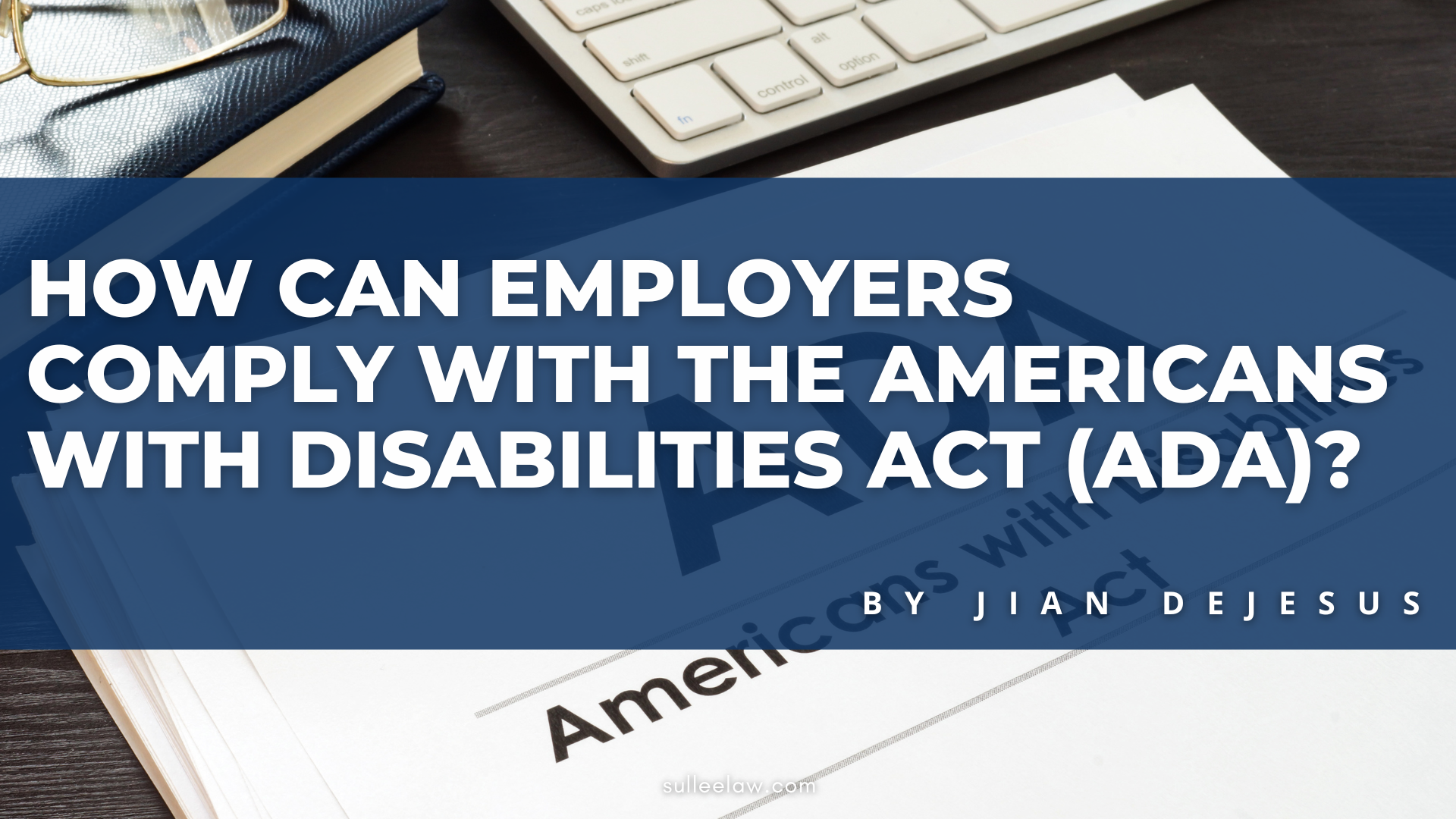The Front of the Class is a 2008 film, featuring the real-life story of Bradley Cohen, a man with Tourette syndrome who diligently pursued his passion of becoming a teacher and thereby defying the odds and challenges typically faced by individuals with Tourette syndrome. In the film, Mr. Cohen fought to get interviews at various schools, saying, “Just get me the interview, and let me prove to them that I can do the job. The Americans with Disabilities Act says I’m entitled to a chance.”
Mr. Cohen’s line shows the essence of the findings and purpose of Congress in enacting the Americans with Disabilities Act (ADA). Section 12101 of the ADA states the following:
[P]hysical or mental disabilities in no way diminish a person’s right to fully participate in all aspects of society, yet many people with physical or mental disabilities have been precluded from doing so because of discrimination; others who have a record of a disability or are regarded as having a disability also have been subjected to discrimination.
The ADA seeks to give individuals with disabilities a fighting chance in seeking and obtaining employment, but more than that, it provides an avenue for these individuals to pursue their dreams.
What is the Americans with Disabilities Act (ADA)?
The ADA seeks to provide enforceable standards on behalf of individuals with disabilities, whether the individual is simply a job applicant or a present employee, to protect these individuals from employment discrimination based on the individual’s disability.1 Employers, therefore, cannot discriminate against qualified individuals with disabilities in the following circumstances: “job application procedures, hiring, firing, advancement, compensation, job training, and other terms, conditions, and privileges of employment.”2
Title I of the ADA covers private entities with fifteen (15) or more employees, state and local government employers, employment agencies, labor organizations, and joint labor-management committees.3
Meanwhile, Title II of the ADA governs the employment practices of state and local governments of any size.4
Does an Employee fall within the scope of the ADA?
How is “disability” defined?
An individual with a “disability” is one who (1) has “a physical or mental impairment that substantially limits one or more major life activities of such individual; (2) [has] a record of such an impairment; or” (3) is “regarded as having such an impairment” such that an employer acts in a way that violates the protections afforded by the ADA (unless the employer believes the individual’s impairment is minor and lasts or is expected to last for six months or less).5
Some examples of major life activities include seeing, hearing, walking, speaking, reading, and more. 6 Further, a record of a disability could include individuals who have “recovered from cancer or mental illness.”7
Who is a “qualified individual”?
Section 12111 defines a “qualified individual” as someone who is able to perform the essential functions of a position with or without reasonable accommodation. These “essential functions” are determined by the employers but are generally considered the basic job duties (e.g., this can include functions described in a job posting). To take it one step further, individuals who “have a known association or relationship with an individual with a disability” are also protected.8
As such, applicants and employees with disabilities fall within the scope of the ADA if they satisfy the job-related requirements (e.g., skills, experience, education) and have the ability to perform the duties outlined for a position.9 However, keep in mind that federal employees and applicants are covered by Section 501 of the Rehabilitation Act of 1973 instead of the ADA, but the Rehabilitation Act does cover the same or similar protections as the ADA.10
As an Employer, how can I comply with the ADA?
If you are an employer with fifteen (15) or more employees, then Title I of the ADA requires that you provide “reasonable accommodations to applicants and employees with disabilities that require such accommodations due to their disabilities.”11
Reasonable Accommodations
Upon an employer’s awareness “of a qualified individual with a disability,” employers are required to give reasonable accommodation to the employee.12 However, if the individual with a disability does not make a request for accommodation, then the employer does not have to provide one.13 As such, it is generally “the responsibility of the employee” to make the employer aware “that an accommodation is needed.”14
These “reasonable accommodations” can include (1) “making existing facilities used by employees readily accessible to and usable by individuals with disabilities; and” (2) providing certain accommodations, such as modified work schedules or materials in accessible formats, for individuals with disabilities15. The specifics as to the appropriate accommodations are determined on a case-by-case basis, where the question sought to be answered is the following: Does the accommodation enable the individual with a disability to effectively perform the job?16 The individual may offer a suggestion for accommodation or may work with the employer to identify one.17
However, while employers are required to provide reasonable accommodations to make it possible for an individual with a disability to perform their job, employers do not have to provide such accommodations (1) if it imposes an undue hardship and/or (2) unless the individual with a disability has asked the employer for one. 18
An “undue hardship” is defined by the ADA as “an action requiring significant difficulty or expense.”19 To determine such significance, the following are considered: (1) “the nature and cost of the accommodation”; (2) the “financial resources of the facility” in providing such accommodation, the number of employees at the facility, “the effect on expenses and resources . . . upon the operation of the facility”; (3) the “financial resources of the covered entity,” the number of employees of the entity, “the number, type, and location of its facilities”; and (4) “the type of operation” of the entity and the “geographic separateness, administrative, or fiscal relationship of the facility” to the entity.20
ADA Employment Discrimination Claims Made Against Employers
If an individual with a disability has opposed discriminating employment practices or sought to make a charge against you for employment discrimination pursuant to the ADA, then it is unlawful for you, as the employer, to retaliate against your employee for making such an opposition or claim.21 Examples of retaliation could include giving the employee a lower performance evaluation “than it should be”, verbally or physically abusing the employee, “transfer[ring] the employee to a less desirable position,” punishing the employee by changing her work schedule, and more.22
For more information, please visit the U.S. Department of Labor’s Office of Disability Employment Policy’s website or view the resources found at the Job Accommodation Network.
- Employer-Provided Leave and the Americans with Disabilities Act, U.S. Equal Emp’t Opportunity Comm’n (May 9, 2016), https://www.eeoc.gov/laws/guidance/employer-provided-leave-and-americans-disabilities-act#. ↩︎
- Fact Sheet: Disability Discrimination, U.S. Equal Emp’t Opportunity Comm’n, https://www.eeoc.gov/laws/guidance/fact-sheet-disability-discrimination (last visited Mar. 20, 2024); 42 U.S.C. § 12112(a). ↩︎
- 42 U.S.C. § 12111(5)(A); Employer’s Practical Guide to Reasonable Accommodation Under the Americans with Disabilities Act, Job Accommodation Network, https://askjan.org/publications/employers/employers-guide.cfm (last visited Mar. 21, 2024). ↩︎
- The ADA: Questions and Answers, U.S. Equal Emp’t Opportunity Comm’n, https://www.eeoc.gov/laws/guidance/ada-questions-and-answers (last visited Mar. 21, 2024).
↩︎ - 42 U.S.C. § 12102(1).
↩︎ - ADA Frequently Asked Questions, ADA Nat’l Network, https://adata.org/faq-search?keys=&tid=All&tid_1=All&spmsde_field1= (last visited Apr. 9, 2024).
↩︎ - Id. ↩︎
- Id. ↩︎
- Applying Performance and Conduct Standards to Employees with Disabilities, U.S. Equal Emp’t Opportunity Comm’n, https://www.eeoc.gov/laws/guidance/applying-performance-and-conduct-standards-employees-disabilities# (last visited Mar. 21, 2024). ↩︎
- See id. ↩︎
- Employer-Provided Leave and the Americans with Disabilities Act, supra note 1; see 42 U.S.C. § 12111(9).
↩︎ - Your Employment Rights as an Individual with a Disability, U.S. Equal Emp’t Opportunity Comm’n, https://www.eeoc.gov/laws/guidance/your-employment-rights-individual-disability# (last visited Mar. 20, 2024). ↩︎
- The ADA: Questions and Answers, supra note 4.
↩︎ - Your Employment Rights as an Individual with a Disability, supra note 12.
↩︎ - 42 U.S.C. § 12111(9).
↩︎ - The ADA: Questions and Answers, supra note 4.
↩︎ - Id.
↩︎ - The ADA: Your Responsibilities as an Employer, U.S. Equal Emp’t Opportunity Comm’n, https://www.eeoc.gov/publications/ada-your-responsibilities-employer#:~:text=Under%20the%20ADA%20%2C%20workers%20with,by%20you%20for%20your%20employees (last visited Mar. 20, 2024). ↩︎
- 42 U.S.C. § 12111(10).
↩︎ - Id.
↩︎ - Fact Sheet: Disability Discrimination, supra note 2.
↩︎ - Facts About Retaliation, U.S. Equal Emp’t Opportunity Comm’n, https://www.eeoc.gov/publications/ada-your-responsibilities-employer#:~:text=Under%20the%20ADA%20%2C%20workers%20with,by%20you%20for%20your%20employees (last visited Mar. 20, 2024) (stating that the Equal Employment Opportunity Commission prohibits employers from “punishing job applicants or employees for asserting their rights to be free from employment discrimination”).
↩︎

